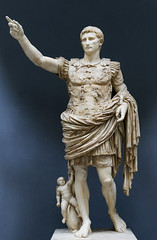| 5359339730 | Alexander the Great | Alexander III of Macedonia, conqueror of the Persian Empire and part of northwestern India. |  | 0 |
| 5359339732 | Athenian Democracy | A radical form of direct democracy in which much of the free male population of Athens had the franchise and officeholders were chosen by lot. |  | 1 |
| 5359339733 | Caesar Augustus | The great-nephew and adopted son of Julius Caesar who emerged as sole ruler of the Roman state at the end of an extended period of civil war. |  | 2 |
| 5359339734 | Greco Persian War | Two major Persian invasions of Greece, in which the Persians were defeated on both land and sea each time. |  | 3 |
| 5359339735 | Han Dynasty | Dynasty that ruled China, creating a durable state based on Shihuangdi's state-building acheivement. |  | 4 |
| 5359339736 | Hellenistic Era | The period in which Greek culture spread widely into Eurasia in the kingdoms ruled by Alexander's political successors. |  | 5 |
| 5359339738 | Pax romana | The "Roman Peace," a term typically used to denote the stability and prosperity of the early Roman Empire. |  | 6 |
| 5359339739 | Persian Empire | A major empire that expanded from the Iranian plateau to incorporate the Middle East from Egypt to India. |  | 7 |
| 5359339740 | Qin Shihuangdi | First emperor from the Qin that forcibly reunited China and established a strong and repressive state. |  | 8 |
| 5359344081 | Empire | States, political systems that exercise coercive power; often multi-national, aggressive, and often conquer, rule and extract resources from other states. |  | 9 |
| 5359496041 | Imperial State | A state that imposes its will on other states politically, economically and socially. |  | 10 |
| 5470819564 | Pater Familias | "father of the family"; this was generally the eldest man of the house, and he ruled the household; he'd decide marriage for the kids, and what job they would do and he could punish them too; he could even sell them to slavery |  | 11 |
| 5470857261 | Roman Republic | The period from 507 to 31 B.C.E., during which Rome was largely governed by the aristocratic Roman Senate. |  | 12 |
| 5472106092 | Mandate of heaven | An ancient Chinese belief and philosophical idea that heaven granted emperors the right to rule based on their ability to govern well and fairly. If the emperor does not fulfill his obligations then he loses the Mandate and therefore the right to be emperor. The fact that a ruler was overthrown was taken by itself as an indication that the ruler had lost the Mandate of Heaven. |  | 13 |
AP World History Strayer Chapter 3 Ericson Flashcards
Primary tabs
Need Help?
We hope your visit has been a productive one. If you're having any problems, or would like to give some feedback, we'd love to hear from you.
For general help, questions, and suggestions, try our dedicated support forums.
If you need to contact the Course-Notes.Org web experience team, please use our contact form.
Need Notes?
While we strive to provide the most comprehensive notes for as many high school textbooks as possible, there are certainly going to be some that we miss. Drop us a note and let us know which textbooks you need. Be sure to include which edition of the textbook you are using! If we see enough demand, we'll do whatever we can to get those notes up on the site for you!

